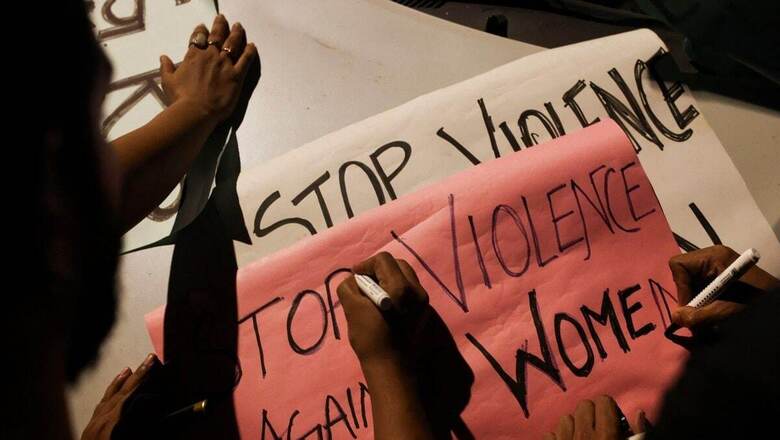
views
Kerala is often hailed for its progressive values and its cinema that frequently addresses women’s issues with nuance and empathy. However, beneath this veneer lies a troubling reality: the women who bring these stories to life are often subjected to systemic discrimination, harassment, and exploitation. The recent release of the Hema Committee Report exposes the deep-rooted misogyny within the Malayalam film industry and serves as a reminder that progressive cinema does not necessarily translate to progressive working conditions for women.
The 2017 Incident: Catalyst for Unmasking Industry’s Dark Side
The Hema Committee was formed in response to a horrifying 2017 incident that shook Kerala to its core. A prominent actress was abducted, assaulted, and filmed by a group of men who later tried to use the footage for blackmail. The involvement of a well-known male actor, accused of masterminding the assault to settle personal scores, added a layer of betrayal and shock. This incident ignited widespread outrage, leading the state government to appoint a three-member committee, chaired by Justice Hema, a retired Kerala High Court judge, to investigate sexual harassment and gender bias within the Malayalam film industry.
The findings of the Hema Committee, submitted in a comprehensive 295-page report in 2019, were explosive. However, the Kerala government inexplicably delayed its release, prompting legal battles and public outcry. Finally, in 2024, a redacted version of the report was made public, and its contents left the state reeling. The report paints a grim picture of an industry where women are systematically exploited, marginalised, and silenced, with little recourse for justice.
A Male-Dominated Industry: The Culture of Silence and Abuse
The Hema Committee Report exposes a deeply toxic environment for women in the Malayalam film industry, where sexual harassment is not only prevalent but normalised. Powerful men routinely demand sexual favours in exchange for roles, career advancement, or even basic professional respect. Women who resist these demands are often sidelined, ostracised, or blacklisted, effectively ending their careers. These abuses are not isolated incidents but part of a pervasive culture of misogyny and exploitation that has persisted unchecked for decades.
One of the most troubling revelations in the report is the pervasive fear that silences women who experience harassment. This fear of retaliation is so profound that many women endure abuse rather than risk the severe personal and professional consequences of reporting it. The report documents how women who come forward face a coordinated backlash not only from within the industry but also from fan clubs and social media, making the pursuit of justice a perilous and daunting endeavour.
The Malayalam film industry, like many others, is dominated by a few influential male actors, directors, and producers who hold disproportionate power. This male dominance creates an environment where women are marginalised and excluded from key decision-making processes. The report highlights structural discrimination, including the lack of basic facilities such as separate toilets and changing rooms. In some cases, women are forced to relieve themselves in open spaces, a degrading reality that underscores the industry’s disregard for their dignity and well-being.
The report also reveals various forms of exploitation women face, including financial extortion, and physical and psychological harassment. These abuses have become so entrenched that they are regarded as an open secret, with many aware but unwilling to address them. The Hema Committee’s findings highlight the urgent need for a comprehensive overhaul of the industry’s practices and culture, which have long facilitated and perpetuated these abuses.
Recommendations for Structural Reform: A Blueprint for Change
The Hema Committee did not merely catalogue the industry’s failings; it also provided a comprehensive blueprint for reform. Among its most crucial recommendations is the establishment of Internal Complaints Committees (ICCs) in all production houses, in accordance with the Sexual Harassment of Women at Workplace (Prevention, Prohibition, and Redressal) Act, 2013. These committees are essential for providing women with a safe, confidential platform to report harassment and seek justice without fear of retribution. The report emphasises that these committees must be independent, well-resourced, and empowered to take decisive action against offenders.
The committee also calls for mandatory gender sensitisation programs for all industry stakeholders, including actors, directors, producers, and technicians. These programs are designed to challenge and dismantle the deeply entrenched patriarchal attitudes that have allowed harassment and discrimination to thrive. The report further recommends increasing the representation of women in decision-making roles, such as directors and producers, as a critical step toward breaking the male-dominated power structures that currently govern the industry.
Another significant recommendation is the need for the government to play an active role in monitoring and enforcing these reforms. The Hema Committee urges the Kerala government to create a task force dedicated to overseeing the implementation of its recommendations, ensuring that they lead to real, substantive change rather than being reduced to symbolic gestures. This task force should have the authority to hold those accountable who fail to comply with the new regulations and to impose penalties on production houses that continue to violate women’s rights.
Role of Industry Bodies: Leading by Example
While the government’s role is crucial, the responsibility for driving change also lies with industry bodies such as the Association of Malayalam Movie Artists (AMMA) and the Film Employees Federation of Kerala (FEFKA). These organisations have historically been criticised for their inadequate response to allegations of harassment and exploitation. The Hema Committee’s report presents them with an opportunity to redeem themselves by taking a firm, proactive stance against such practices and leading the charge for reform.
The AMMA and FEFKA must not only adopt the report’s recommendations but also set industry-wide standards for the ethical treatment of women. This includes establishing clear codes of conduct, ensuring that all members are aware of and adhere to these standards, and taking swift, decisive action against those who violate them. The credibility and future of these organisations depend on their ability to rise to this challenge and demonstrate a genuine commitment to gender equality.
A Reflection of Broader Societal Issues
The issues exposed by the Hema Committee are not confined to the film industry; they are symptomatic of broader societal problems that continue to plague Indian society. Despite Kerala’s reputation for progressiveness, the report reveals that deep-seated misogyny and gender-based violence are still pervasive. The exploitation and harassment of women in the workplace is not unique to the film industry but widespread across various sectors, reflecting the entrenched patriarchal values that continue to undermine gender equality.
The report serves as a stark reminder that even in states like Kerala, which boast high literacy rates and relatively better social indicators for women, gender equality remains an elusive goal. The findings of the Hema Committee should therefore be seen as a call to action for the entire state to confront and address these issues head-on, not just within the film industry but across all sectors of society.
The Power of Public Discourse: Keeping the Pressure On
The successful implementation of the Hema Committee’s recommendations will require sustained public pressure and discourse. The media, civil society, and the public must continue to engage with the issues raised by the report, ensuring that they remain in the public consciousness and that the government and industry are held accountable. This requires ongoing dialogue, advocacy, and activism, with a focus on keeping the momentum for change alive.
Public discourse also plays a crucial role in challenging the culture of silence that has long protected perpetrators of harassment and exploitation. By fostering open conversations about these issues, society can begin to dismantle the stigma and fear that often prevent women from coming forward. The report provides an opportunity for the industry and the public to engage in meaningful self-reflection and to work together towards creating a more just and equitable environment for all.
Seizing the Moment for Lasting Change
The Hema Committee Report is more than a mere document; it represents a powerful critique of the Malayalam film industry and a crucial blueprint for transformative change. Its recommendations are practical, essential, and long overdue. The success of these recommendations will hinge on the collective will of the government, industry, and society to take decisive and meaningful action.
Kerala stands at a pivotal moment. The state has the opportunity to leverage the findings of this report to affect a significant shift toward gender equality, extending beyond the film industry to all sectors. While the path to change will be challenging, the potential benefits—creating a safer, more equitable environment for women in the workplace—are substantial and worthwhile.
The Hema Committee Report should be viewed not as the conclusion of a process but as the inception of a new chapter in the quest for gender equality and respect. By integrating the report’s recommendations into the core of both industry practices and societal norms, we will move closer to a reality where women can work with safety and dignity. This effort goes beyond mere industry reform; it is about fundamentally transforming societal attitudes and structures.
Amal Chandra is an author, policy analyst and columnist. Views expressed in the above piece are personal and solely that of the author. They do not necessarily reflect News18’s views.


















Comments
0 comment